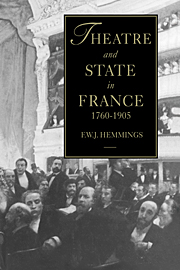Book contents
- Frontmatter
- Contents
- Chronology
- Introduction
- 1 The royal theatres of the ancien régime
- 2 The rise of the commercial theatre
- 3 Dramatic censorship down to its abolition
- 4 The liberation of the theatres
- 5 The royal theatres under the Revolution
- 6 The theatre in the service of the Republic
- 7 Re-establishment of the state theatres
- 8 Curbs on the commercial sector
- 9 Politics and the pit
- 10 The theatre in the provinces
- 11 The licensing system, 1814–1864
- 12 The state-supported theatres in the nineteenth century
- 13 The theatre in crisis: competition from the café-concert
- 14 Dramatic censorship in the nineteenth century
- 15 The private sector
- Notes
- Bibliography
- Guide to further reading
- Index
8 - Curbs on the commercial sector
Published online by Cambridge University Press: 31 October 2009
- Frontmatter
- Contents
- Chronology
- Introduction
- 1 The royal theatres of the ancien régime
- 2 The rise of the commercial theatre
- 3 Dramatic censorship down to its abolition
- 4 The liberation of the theatres
- 5 The royal theatres under the Revolution
- 6 The theatre in the service of the Republic
- 7 Re-establishment of the state theatres
- 8 Curbs on the commercial sector
- 9 Politics and the pit
- 10 The theatre in the provinces
- 11 The licensing system, 1814–1864
- 12 The state-supported theatres in the nineteenth century
- 13 The theatre in crisis: competition from the café-concert
- 14 Dramatic censorship in the nineteenth century
- 15 The private sector
- Notes
- Bibliography
- Guide to further reading
- Index
Summary
The liberation of the theatres in 1791 had been justified, as we have seen, by the argument that the alternative, to allow only a few favoured individuals to engage in this particular form of the entertainment industry, would have been to perpetuate a system of privilege at variance with the basic ethos of the Revolution. But the immediate consequence had been more explosive than anyone had anticipated, and even though, after the first furious stampede, the number of new registrations dropped, the continuing eagerness to open new theatres caused concern even under the Convention. The question was referred to Anacharsis Clootz, the German radical writer who was granted honorary French citizenship in 1792 and elected to the National Assembly; in his report he discounted fears of a decline in the standards of the dramatic art, that ‘more would mean worse’, to use the modern catch-phrase, and argued in favour of allowing free play to the laws of supply and demand. ‘Leave it all to private industry’, he concluded; ‘the theatres are in the same case as bakers’ shops, the only concern of government must be to ensure that no poisonous stuff is offered for sale, whether for the mind or the body, nothing but sound nourishment.’ By ‘poisonous stuff’ Clootz clearly had in mind as much the ideologically dangerous as the indecent in stage offerings, and intended by this phrase a timely assertion of the state's duty to monitor the contents and tendencies of new plays.
- Type
- Chapter
- Information
- Theatre and State in France, 1760-1905 , pp. 113 - 122Publisher: Cambridge University PressPrint publication year: 1994



